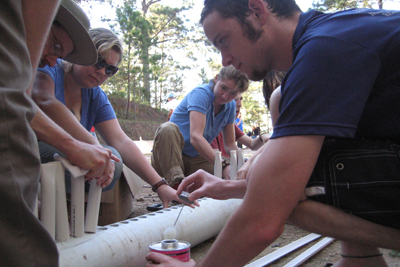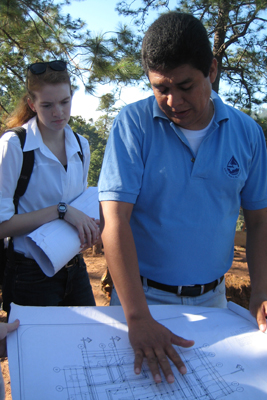Eighth student-designed water plant rises in Honduran town
By Anne Ju

Atima, HONDURAS -- In a few months, nearly every home in this modest Honduras hilltop town will have safe, clean drinking water, thanks to a water treatment plant principally designed by Cornell engineering students.
The Atima plant, under construction, is the eighth project of AguaClara, Cornell's internationally recognized small-scale water treatment design team that has been working since 2005 in Honduras, where 60 percent to 70 percent of people do not have access to clean water. So far, AguaClara plants serve some 25,000 people.

Sixteen AguaClara team members, mostly undergraduate civil engineering students, visited the Atima construction site as part of an exhaustive two-week excursion Jan. 6-20 across Honduras with their leader, Monroe Weber-Shirk, senior lecturer in civil and environmental engineering. It was the seventh such adventure for AguaClara; the winter break trip is considered an integral part of the students' connection with their work and their ability to experience the political and social aspects of implementing water plants.
Students see so much of the computer software engineering they use for design that "it's interesting to see an actual physical process going on," said Tori Klug '14. "It's also really good we're forming relationships with everyone down here."
AguaClara's longstanding partner is Agua Para el Pueblo (APP), a Honduran nonprofit organization that offers technical expertise and education to help municipalities implement water treatment systems.
This year's AguaClara team visited working plants, plants in process and future plant sites, such as one in early design phases in the town of San Nicolas.
A previous generation of AguaClara students invented an automated design tool that has greatly increased the efficiency with which students can generate basic designs for new plants. Improvements are constantly being made on the tool, and Weber-Shirk says it is a key reason why AguaClara plants can be scaled to fit individual communities.
On site, the students can deal with many unknowns, many of which cannot be solved from Ithaca.
"Every plant is different, and the terrain is always different," said Annie Newcomb '13.
In Honduras, the students also get to see the politics, fundraising and technical challenges that sometimes derail projects. But Weber-Shirk maintains AguaClara's plans for scalability, cost reduction and expansion are on the right track.
"Every one of the AguaClara facilities continues to provide safe drinking water," he said. "This is an amazing accomplishment in a world of failed development projects."
That AguaClara works so well is due to its partners on the ground. Antonio Elvir, APP's social and education coordinator for AguaClara projects, is the students' key liaison with Honduran communities.
Also, for the past several years, Sarah Long '09; Jeff Will '10, M.Eng. '11; Dan Smith '06 and others have moved to Honduras to work as AguaClara engineers, serving as advisers between APP and Cornell.
In Ithaca this semester, Klug and Newcomb are designing a more efficient, unified chemical dosing system for future plants to allow plant operators to be more precise in knowing how much chlorine to add to the water.
The system would build on AguaClara's innovative chemical dose controller, an automated tool that adds coagulant at a consistent rate, without the use of motors or electricity, as the water enters the plant.
And Jordanna Kendrot, M.Eng. '12, is working on improving the dose controller, which has proven tricky to get just right. Hopefully, an upgrade would allow completed plants to easily retrofit their equipment to more accurately and consistently apply coagulant.
Media Contact
Get Cornell news delivered right to your inbox.
Subscribe